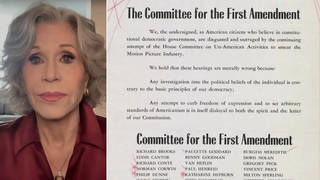
Topics
Guests
- Zahra Naderfreelance Afghan journalist based in Canada and editor-in-chief of Zan Times, a new Afghan women-led outlet documenting human rights issues in Afghanistan.
Links
A top United Nations official said Wednesday that “Afghanistan under the Taliban remains the most repressive country in the world regarding women’s rights.” Since taking power nearly 19 months ago, the Taliban has moved systematically to erase women from public life by banning women and girls from schools, from working with nongovernmental organizations and from traveling without a male relative. “Afghanistan is now effectively one of the biggest prisons in the world for women,” says Zahra Nader, a freelance Afghan journalist who was formerly a reporter for The New York Times in Kabul and is now based in Canada. She is the editor-in-chief of Zan Times, a new Afghan women-led outlet documenting human rights issues in Afghanistan.
More from this Interview
- Part 1: International Women’s Day: Roots in Radical History, Labor & Reproductive Rights
- Part 2: “Stand Up for Afghan Women”: U.N. Calls Afghanistan World’s Most Repressive Country for Women, Girls
- Part 3: “Women, Life, Freedom”: Iranian Women Continue Protests Amid Crackdown & Poisonings at Girls’ Schools
- Part 4: “Torture”: El Salvador’s Abortion Ban Condemned, Highlights Horrors Facing U.S. After Roe Overturned
Transcript
AMY GOODMAN: This is Democracy Now!, democracynow.org, The War and Peace Report. I’m Amy Goodman, with Nermeen Shaikh.
As we continue to mark International Women’s Day, we turn to Afghanistan. Earlier this week, a top U.N. official accused the ruling Taliban of gender apartheid by erasing women from public life. This is Richard Bennett, the U.N. special rapporteur on human rights in Afghanistan.
RICHARD BENNETT: The Taliban’s intentional and calculated policy is to repudiate the human rights of women and girls and to erase them from public life. It may amount to the international crime of gender persecution, for which the authorities can be held accountable. The cumulative effect of the restrictions on women and girls has a devastating long-term impact on the whole population, and it is tantamount to gender apartheid.
AMY GOODMAN: Earlier today, another top U.N. official in Kabul said, quote, “Afghanistan under the Taliban remains the most repressive country in the world regarding women’s rights,” unquote.
Since taking power nearly 19 months ago, the Taliban has moved to erase women from public life, banning women and girls from schools, from working with nongovernmental organizations and from traveling without a male relative.
On Monday, young Afghan women gathered outside Kabul University to protest the Taliban’s ban on female education. Cellphone video shows young women sitting on the ground outside the university reading their books in open defiance of the Taliban.
We’re joined now by Zahra Nader. She is a freelance Afghan journalist who was formerly a reporter for The New York Times in Kabul. She’s now based in Canada. She’s the editor-in-chief of Zan Times, a new Afghan women-led outlet documenting human rights issues in Afghanistan.
Zahra, thanks so much for joining us again on Democracy Now! Can you talk about the state of women in your country?
ZAHRA NADER: Thank you, Amy, for having me on this special day and giving me an opportunity to speak about the situation of women in Afghanistan.
As we heard and as you mentioned, Afghanistan is now effectively one of the biggest prisons in the world for women. And what we are seeing and what is happening in the past 19 months is a continuation of building a gender apartheid in Afghanistan. And I think what’s happening is going something beyond what we understand as the concept of gender apartheid, because at least in gender apartheid people of the same color are allowed to interact with each other. That’s not happening in Afghanistan, where women, based on their gender, are effectively in prison in their home.
And the recent development, as you mentioned, is that the word that the U.N. special rapporteur used was very strong. And gender prosecution, which could be prosecuted, he said, amount to gender — amount to crime against humanity. So, this is the development that’s happening. Women are no longer allowed in Afghanistan to go to school. They cannot go to university. They cannot work, neither in public sector nor in NGOs, which that, by itself, affects 11.6 million women in Afghanistan, according to U.N. data. And then, Afghanistan is one of the countries that has one of the largest population of widowed women because of the four decades of war we had. So there is a lot going on with women in Afghanistan.
And what’s happening is, unfortunately, we are really having little sense of how do women in Afghanistan are living to save their lives, with not having access to public life, not being able to fully, and even very minorly, to participate in life in Afghanistan, in public life in Afghanistan. So, what we are hearing is that there is no legal protection for women in Afghanistan, especially for those that are fleeing domestic violence. As we know, even before the Taliban takeover, Afghanistan was one of the countries that was rated as the worst country to be a woman in. And also we had reports from Afghanistan Independent Human Rights Commission before saying that 95% of violence against women are happening at the home. And what is really the scale of that violation and that violence of women in Afghanistan, I feel that we don’t have a clear view of what is exactly taking place, because lots of independent journalists, media, are shut down. They cannot function because of the Taliban censorship, because of Taliban threat and intimidation that we continue to hear and also experience, as all journalists are in Afghanistan and working and trying to raise the voice of women from Afghanistan.
So, what we are hearing is lots of concern, a lot of strong languages in terms of saying what’s happening. But what we are seeing is little action to actually reverse this human rights violation, to take a powerful and strong and global stand that this should not be tolerated, as Richard Bennett also mentioned in his report that it’s intolerable and should not be normalized. And also what we are seeing in Afghanistan is some level of normalization of these violations.
NERMEEN SHAIKH: So, Zahra, can you talk about how life for women, everyday life for women, in Afghanistan has changed in these last 19 months? Your newspaper, Zan Times, spoke to some women. Tell us what they told you ahead of International Women’s Day.
ZAHRA NADER: So, what they’re telling us is a sense of depression, a sense that you wake up every day in your life, and you have nothing to go for. There is nothing for you to stand up and say, “This is what I’ll be doing today.” There is no hope for education. There is no hope for you to contribute to your society. And what we are hearing is a lot of sense of hopelessness among women, and they’re committing suicide in greater number. However, it’s so hard to get data, as I said that the Taliban are severely repressing and suppressing media and freedom of information in Afghanistan. So, there is a lot going on in the lives of women, who see no hope or no light at the end of the tunnel. This is one part that we obviously see and read and we hear from the people and my colleagues who are working in Afghanistan.
But also, there is the hope. Those women that protested yesterday in Kabul, they know what they’re facing. They know that when they go to streets and ask for their rights, it’s gone, it’s the killing. They might be killed on the streets, and nothing’s going to be changed, but they are still willing to take that risk, because that is what’s going to, you know, bring them hope. This is a fight for them to resist for their fight and what they want. Even if that come at the cost of their own lives, they are willing to take that. That’s one way that they go to the protest. And as we see, that there’s a lot of crackdown. The Taliban are torturing, arresting and beating them on the streets and also kidnapping them. We have women right now in prison, like Narjis Sadat, who are in prison because they protested, because they asked for their rights. This is one way they are continuing to come to the street and resist; however, there’s other ways that they continue their resistance.
And that’s — so, recently I wrote a piece about women creating online spaces for themselves to come together, and their fight is to keep hope alive for themselves, because they know in this darkness that they are facing, that there is no hope for them. They need to survive, because they need to think beyond this, beyond what’s happening in today. And that is something that they are trying to — to read books, to have a sense that the dark days will pass, and they have to be ready for when it’s passed, and they have to have their motivation. Their hope is still there for them that they can continue.
So, the resistance, the women in Afghanistan are courageously continuing. But there is little we are seeing that the international community is doing to support these voices, to support the justified demand of these women in Afghanistan, who are half of the population. And they deserve, they need, and their rights must be protected. If it doesn’t, I think it’s very hard to speak of international community and speak of human rights as universal standards.
NERMEEN SHAIKH: Zahra, can you talk about — what do you think the international community can do to stand in solidarity with women? And speak specifically about how Afghanistan is also confronting this horrific humanitarian catastrophe and how that’s been exacerbated by sanctions, as well as massive cuts in foreign aid.
ZAHRA NADER: Thank you. So, I’m going to go back to humanitarian crisis. Right now as we speak, an estimated 28 million people in Afghanistan are needing urgent assistance. What that really means is that since the Taliban takeover, there is one twofolded issue that we have to speak about. One is that the humanitarian crisis didn’t happen by itself. Of course, it happened with the withdrawal and also the return of the Taliban. But what’s really exacerbated this crisis is the Taliban cutting off half of the society from, essentially, making it impossible for them to earn their living. That is one crucial point that we have to always consider, how the people of Afghanistan can overcome this human rights crisis and humanitarian crisis if the Taliban won’t allow women to work. And also, they stopped some of industries, like music. They won’t be functioning, because the Taliban said that this is illegal. It’s haram for them. So, there is a lot — lots of this humanitarian crisis is created directly by the Taliban’s policies.
And there is one side we are seeing that moneys goes to Afghanistan. Humanitarian aid still continue, and we have the U.N. appealing for $4.6 billion for 2003 in Afghanistan. And that’s a lot. So, we are also concerned about the money, that we are seeing $40 million, which is arriving in Afghanistan weekly. Where that money is being spent is a huge question for the people of Afghanistan, because what we are seeing on the ground, what we are talking to the people, they are telling us that this money is not reaching its intended recipients. Those who are most at need, women who lead a household, women who doesn’t have a mahram, we can certainly talk with them, and they say they are not able to access this aid. So, this is the question of — in terms of thinking where that aid that is arriving in Afghanistan, where that aid is going. We are very worried that the people on the ground telling us this money is helping sustain the Taliban. And that’s a worry. And I’m living here as a way to raise an accountability and monitorship of seeing where this money is going, because we don’t want this money to feed the Taliban and sustain them.
So, there is this part of the humanitarian crisis that is happening in Afghanistan. But how can we go beyond this is actually thinking about the society where all the people of Afghanistan have their own rights, so they have the ability to actually earn their living. That ability is right now taken away by the Taliban from half of the society, to say the least. And for the other half, there is so many problems created by this Taliban, which won’t allow them to continue their work, to continue their living. So, when we are talking about humanitarian crisis —
AMY GOODMAN: Zahra, we have 30 seconds.
ZAHRA NADER: — we have to see all of this. We have to see all of this. So, humanitarian crisis cannot be seen as only one single issue and something that encourages the countries to engage with the Taliban. The action that needs to be taken, I really welcome the action that the European Union taken to sanction to Taliban ministers, but that is not enough. We have to go beyond that. What can be done is that the international community is standing together, especially the countries who have [inaudible] foreign policy and the countries who have a strong demand on human rights — a strong stand on human rights. They have to come together, and they have to think over this as a global issue. This is something — this is not about women’s rights in Afghanistan only. This is about women’s rights globally. And if we cannot deal with this in Afghanistan, be assured that this will extended to other countries. And that is very unfortunate.
And I hope that we can call on this special day to all women across the world, that please stand up for Afghan women. Please stand up for their rights, because they don’t have the means to fight back the way you see other women in other countries can fight. They don’t have the means to come to the streets every day to make sure that their voices are heard, because they are being beaten, they are being tortured, they are being kidnapped. So they need your help to — they need you to stand for their rights and speak and pressure your governments to take — to be accountable, especially if your government is one of those that were involved in Afghanistan in the past 20 years. You need to take them accountable and to say what’s happening in Afghanistan is intolerable, and it must be stopped, and it must be stopped now.
AMY GOODMAN: Zahra Nader, we want to thank you for being with us, freelance Afghan journalist, formerly a reporter for The New York Times in Kabul, now based in Ottawa, where she is editor-in-chief —
ZAHRA NADER: Thank you for having me.
AMY GOODMAN: — of Zan Times, a new Afghan women-led outlet documenting human rights issues in Afghanistan.
When we come back, we go to Iran. Stay with us.











Media Options